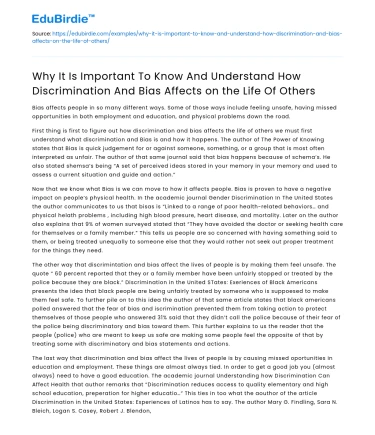Bias affects people in so many different ways. Some of those ways include feeling unsafe, having missed opportunities in both employment and education, and physical problems down the road.
First thing is first to figure out how discrimination and bias affects the life of others we must first understand what discrimination and Bias is and how it happens. The author of The Power of Knowing states that Bias is quick judgement for or against someone, something, or a group that is most often interpreted as unfair. The author of that same journal said that bias happens because of schema’s. He also stated shemsa’s being “A set of perceived ideas stored in your memory in your memory and used to assess a current situation and guide and action.”
Save your time!
We can take care of your essay
- Proper editing and formatting
- Free revision, title page, and bibliography
- Flexible prices and money-back guarantee
Now that we know what Bias is we can move to how it affects people. Bias is proven to have a negative impact on people’s physical health. In the academic journal Gender Discrimination In The United States the author communicates to us that bisas is “Linked to a range of poor health-related behaviors… and physical helath problems , including high blood presure, heart disease, and mortality. Later on the author also explains that 9% of women surveyed stated that “They have avoided the doctor or seeking health care for themselves or a family member.” This tells us people are so concerned with having something said to them, or being treated unequally to someone else that they would rather not seek out proper treatment for the things they need.
The other way that discrimintation and bias affect the lives of people is by making them feel unsafe. The quote “ 60 percent reported that they or a family member have been unfairly stopped or treated by the police because they are black.” Discrimination in the United STates: Exeriences of Black Americans presents the idea that black people are being unfairly treated by someone who is suppoesed to make them feel safe. To further pile on to this idea the author of that same article states that black americans polled answered that the fear of bias and iscrimination prevented them from taking action to protect themselves of those people who answered 31% said that they didn’t call the police because of their fear of the police being discriminatory and bias toward them. This further explains to us the reader that the people (police) who are meant to keep us safe are making some people feel the opposite of that by treating some with discriminatory and bias statements and actions.
The last way that discrimination and bias affect the lives of people is by causing missed oportunities in education and employment. These things are almost always tied. In order to get a good job you (almost always) need to have a good education. The academic journal Understanding how Discrimination Can Affect Health that author remarks that “Discrimination reduces access to quality elementary and high school education, preperation for higher educatio…” This ties in too what the aouthor of the article Discrimination in the United States: Experiences of Latinos has to say. The author Mary G. Findling, Sara N. Bleich, Logan S. Casey, Robert J. Blendon, John M. Benson and Justin M. Sayde state both that “Compared to whites, Latinos were younger, less likely to have a college degree.” and that “ Latinos were significantly more likely than whites to experience discrimination in employment, and promotions, and obtaining equal pay.” In another article called The Power of Knowing the author explains to us that a hiring manager will be more likely to hire someone who he or she can relate to whether it be with tiny details, superficial ones, or personality. So with these quotes it is conveyed to us that one of the reasons we get a job or a promotion is because of how relatable we are to are superior that is looking to hiring or promoting us. So if we look different or like different things that the other we are already at a disadvantage. We are also at a disadvantage given the fact that depending on the school you went to you could have been getting a different education based on your race.
Felling unsafe with the people who are suposed to make you feel safe, Having a less likely chance to get the job or being promoted, having a less education, and not being able to have the proper treatment to something you need to stay healthy are just some of the ways that bias nd discrimination affect the lives of people. So next time you make a statement or say something take in mind that you might be causing someone a job just because of something you might not have known was discriminatory or biased.






 Stuck on your essay?
Stuck on your essay?

